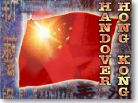|
Capital opportunity in HK
|
 |
June 30, 1997: 7:50 p.m. ET
Laissez-faire capitalism meets communism as handover makes history
From Correspondent Casey Wian
|
HONG KONG (CNNfn) - As Hong Kong ends its term as a British colony, Chinese leaders have promised to let the city continue to operate as a booming free market after the handover.
When the five-day handover festivities end and Hong Kong gets back to work July 3 under a new government, the business community is expecting very little change.
Michael Green arrived in Hong Kong in late 1989 with $1,500, no job and high hopes.
"It's a completely open economy," said Green, now the director of Asia-Pacific research for Salomon Brothers. "It allows people from all walks of life to find their way to the top. There are no barriers."
In just eight years, regularly working weekends and holidays, Green has become one of Hong Kong's growing throng of millionaires with enough money to retire.
"The capital that has been built up just through sheer hard work and the opportunities that have been given to me in this place are such that if I didn't want to work I could actually go and lie on the beach for the rest of my life," Green said.
Yet Michael Green keeps working, and so does Hong Kong. Unemployment is just 2.6 percent, and annual GDP growth is double that.
Hong Kong is the purest example of laissez-faire capitalism in the world today -- and maybe ever. Corporations pay a maximum tax rate of 16-and-a-half percent. For individuals, the top bracket is just 15 percent.
The key question now: Can Hong Kong's economy remain vibrant as part of communist China?
The man who will play the largest role in answering that, Tung Chee-hwa, carries the title not of governor -- like his British predecessors -- but chief executive.
"The investments here are very safe and this is a great place to make money," Tung said. "And all the investments will find great returns. And in fact, over the last few months, if you look at it, our stock market, our property market are all at new highs."
That prosperity presents perhaps Hong Kong's greatest economic challenge -- keeping costs under control. Operating expenses and wages here already are among the highest in the world.
"If you think Hong Kong's expensive today, wait 'til you see it five years from now," said Robert Broadfoot of the Political and Economic Risk Consultancy. "We'll call Tokyo Macy's bargain basement. It is going to be an extremely expensive city. The pressure's going to be on companies always to define what value-added role does Hong Kong have."
For companies such as Merrill Lynch, there's plenty of value. In 1989, Merrill had 60 employees in Hong Kong. Now it has 700.
"We have been constantly growing along with the region," said David Komansky, chairman and chief executive of Merrill Lynch. "Along with the opportunities we find it to be, aside from being one of the most exciting places in the world, I think [it is] commercially one of the most potentially rewarding places that I know of."
Jardine Matheson is a 12-billion dollar Hong Kong conglomerate, with roots in the 19th-century opium wars that brought Great Britain to power here.
Now that Britain is handing Hong Kong back, Jardine and thousands of other companies have shifted their legal headquarters to the Bahamas and elsewhere in the British commonwealth.
At the same time, they are expanding their Hong Kong operations, because it remains a key gateway to huge markets in China and the rest of Asia.
"We are as committed to Hong Kong as I think any company is," Jardine Matheson Chairman Martin Barrow said. "We've continued to make new investments in Hong Kong. In the past year or so looking forward, we've made commitments of around a billion U.S. dollars."
Hong Kong's government may be changing, but its status as the world's largest commercial port, second busiest airport and global capital of cell phone usage will not.
Still, suspicion that business may suffer under Chinese rule lingers.
"It is the face question, right? The Beijing authorities have to show the world that they will do a better job than the British colonial masters," said James Tong, co-director of the USC/UCLA East Asian Studies Center. "If they do not do that, it will be a great loss of face."
Most businesses in Hong Kong are optimistic that china will keep its promise and let the city remain Asia's center of free enterprise. The main reason is that China needs Hong Kong to stay prosperous so it will have access to the capital and brain power that China needs to modernize its economy. 
|
|
|
|
|
 |

|

